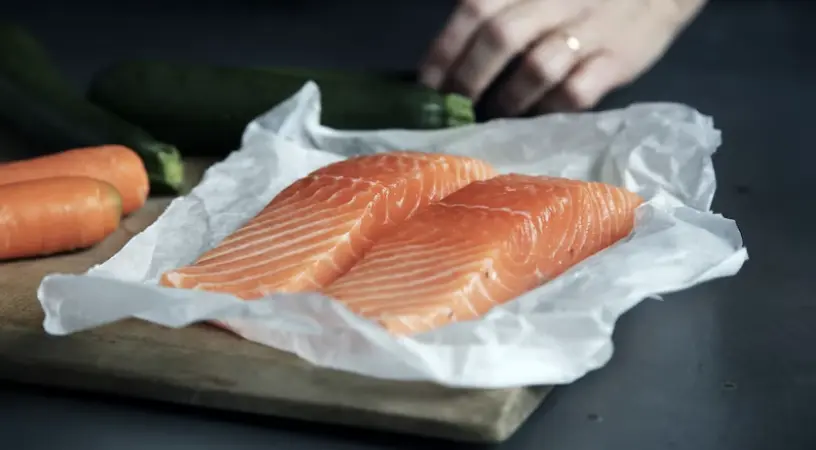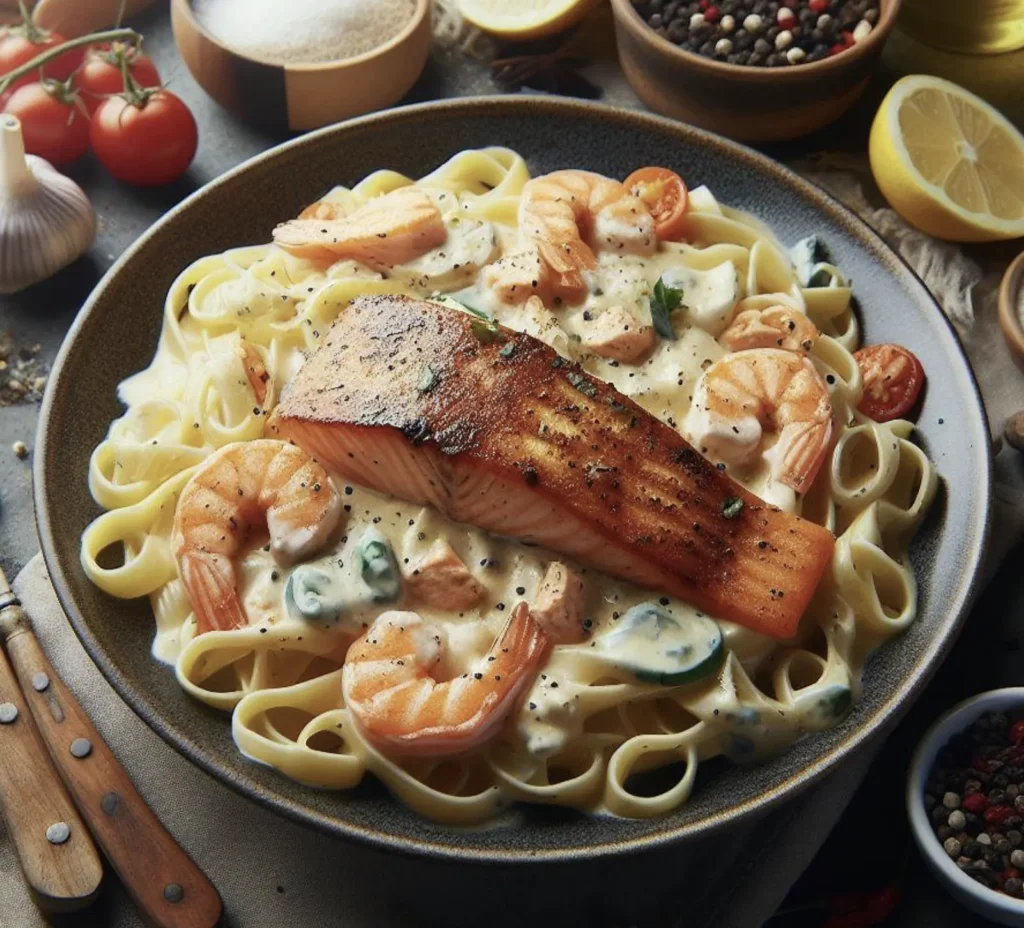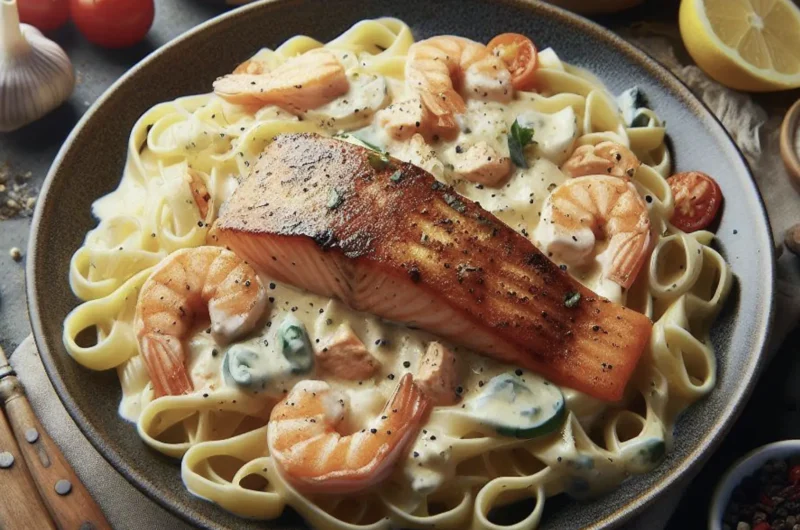From the Bayou to Your Plate: The Origin of Cajun Cuisine
Cajun cuisine is a delightful dance of flavors originating from the bayous of Louisiana. Born from the traditions of French-speaking Acadian immigrants, this flavor-packed culinary style has its roots in both Canada and the American South. When these settlers journeyed southward, they brought with them a love for robust and spicy dishes, laying the foundation for what we now know as Cajun. In this post, we’ll share all the details on how to make a delicious tasting dinner. Once you try our Cajun Salmon Alfredo recipe, you’ll be hooked!
The heart of Cajun cooking is its rich blend of spices. Think garlic powder, onion powder, and a good kick of cayenne pepper. These seasonings, combined with local ingredients, created dishes that were not only hearty but also bursting with flavor. Over time, as these flavors melded and evolved, they started to form the backbone of many Southern classics.
Seafood, given Louisiana’s proximity to the Gulf of Mexico, naturally became a staple in Cajun dishes. Fresh fish, especially salmon, often found its way into the heart of many a delicious recipe. As Cajun cuisine continued to evolve and spread, it began to blend with other culinary traditions, giving birth to innovative dishes like the Cajun salmon alfredo.
The Salmon Story: Picking the Perfect Fish
Let’s talk salmon. In this salmon recipe, the quality of your salmon filets or salmon fillets is paramount. Wild-caught salmon, known for its rich taste and higher content of omega-3 fatty acids, often stands out as a top choice for chefs and home cooks alike. But don’t discount farm-raised salmon, especially if it’s sourced sustainably.
To achieve that perfect flaky salmon texture, it’s vital to cook it just right. Aim for an internal temperature of 145°F. This ensures the salmon is cooked through but retains its moisture and flavor. And before it hits the pan, remember to season the salmon generously. A blend of Cajun spices, a sprinkle of white pepper, and a dash of lemon juice will elevate its natural flavors.
Lastly, while both salmon filets and salmon fillets are correct, they do refer to different cuts. Filets are boneless cuts of fish, while fillets can include bones. So, choose according to your preference and the demands of your recipe.

Photo Credit: CA Creative
The Creamy Dream: Crafting Alfredo Sauce from Scratch
The alfredo sauce is where magic happens. Begin by melting unsalted butter in a large skillet over medium heat. Once it’s all melted and bubbly, toss in those finely minced garlic cloves. Sauteing them for about 2-3 minutes will release an aroma that’s nothing short of heavenly.
Next comes the creamy goodness. Slowly pour in your heavy whipping cream, stirring continuously. As it heats, it’s time to introduce parmesan cheese and cream cheese to the mix. The result? A luxuriously creamy sauce that’s the stuff of dreams. Now, to give our Alfredo its Cajun personality, sprinkle in a generous helping of tbsp cajun seasoning. A dash of cayenne pepper will add that extra zing.
Before you know it, you’ll have crafted a creamy cajun alfredo sauce that’s rich, spicy, and oh-so-indulgent. Whether you’re dressing pasta or drizzling over veggies, this sauce is sure to impress.
Kids in the Kitchen: Making It Fun and Kid-Friendly
Cooking with kids can be a joy, especially with dishes as fun as this one. When crafting a cajun salmon alfredo recipe for the little ones, you might want to dial down the heat. Consider reducing the cayenne pepper and perhaps introduce a splash of coconut milk. This not only gives a milder flavor but also adds a creamy texture that kids love.
Presentation matters, especially to the younger crowd. Opt for kid-favorite pastas like penne pasta or fettuccine pasta. Let them twirl, poke, and have fun with their food. And if you’re looking to get them more involved, let them sprinkle some italian seasoning or tear up some fresh parsley. Hands-on activities make mealtime more engaging.
Remember, the key is to make the dish both tasty and fun. By adapting the spice level and involving them in the cooking process, you’re not only serving up a delicious meal but also creating memories.
Spice It Up: The Art of Cajun Seasoning
Cajun seasoning, the heart and soul of our dish, is a blend of spices that packs a punch. While you can pick up pre-made mixes from the store, there’s a certain charm in whipping up a homemade batch. Start with basics like garlic powder, onion powder, and paprika. From there, build up the heat with black pepper and cayenne pepper.
If you’re looking to store your homemade blend, an airtight container is your best friend. It keeps the spices fresh and ensures their flavors remain potent. Adjust the levels based on your heat preference. After all, the beauty of a homemade cajun seasoning recipe lies in its adaptability.
In the end, it’s all about striking the right balance. With the perfect blend of spices, your Cajun salmon recipe will not only be flavorful but also carry the essence of the bayou with every bite.
Pasta Perfect: Choosing and Cooking the Right Noodles
When it comes to a classic alfredo, most people think of fettuccine pasta. But why not twist things up a bit? Penne pasta is a stellar alternative, allowing the creamy sauce to nestle inside its tubular shape. For those seeking a gluten-free option, there are plenty of pasta alternatives available that maintain that al dente bite we all crave.
Now, speaking of al dente, achieving that perfect pasta texture is paramount. Start by boiling a large pot of water, seasoned with a pinch of kosher salt. This not only flavors your pasta but helps it cook evenly. Once boiling, follow the package instructions closely. Remember, al dente means the pasta should still have a slight bite to it. To ensure this, taste-test a piece about a minute before the recommended cooking time.
Upon reaching that coveted al dente stage, save a cup of the pasta water. This starchy liquid is the unsung hero of the pasta world. It can be used to adjust the consistency of your sauce later on. Once reserved, drain your pasta, and give it a quick toss in a tablespoon of olive oil to prevent sticking. Set aside and let’s get saucy!
Piecing It Together: The Step-by-Step Cajun Salmon Alfredo Recipe
First things first, we need to season those salmon filets. Grab your Cajun spices, black pepper, garlic powder, and sprinkle them generously on both sides of the salmon. For an even richer flavor, let them sit for about 10 minutes, allowing the spices to meld with the fish. While that’s happening, heat up your large skillet over medium high heat with a touch of olive oil.
Once your skillet is hot and ready, place the salmon fillets skin side down. Let them sizzle and cook for about 4-5 minutes until the skin is perfectly crispy. A gentle flip, and another 3-4 minutes will ensure your salmon is cooked to flaky perfection. Once done, set them aside on a paper towel, absorbing any excess oil.
In the very same skillet, dial the heat down to medium and melt some unsalted butter. Toss in minced garlic cloves until they’re fragrant but not browned. Now, pour in your heavy cream, a dash of chicken broth, and begin to whisk. As the mixture heats up, slowly add in your parmesan cheese, stirring continuously. You’ll notice the sauce thickening. If it gets too thick, remember that reserved pasta water? Add it in, a tablespoon at a time, until you reach your desired creamy consistency.
Pairs Well With: Side Dishes to Complete the Meal
The rich and spicy notes of our cajun salmon alfredo recipe beckon for some lighter side dishes to balance the plate. Picture a crisp salad, brimming with fresh baby spinach, slivers of red bell pepper, and a zesty lemon vinaigrette. It provides a refreshing contrast to our creamy pasta, ensuring every bite is a delightful play of flavors.
For those who can’t resist the allure of bread with pasta (and let’s be honest, who can?), a slice of crusty bread with a hint of garlic and Italian seasoning could be your carb-loaded best friend. It’s perfect for scooping up any lingering creamy cajun sauce, ensuring none of that deliciousness goes to waste.
To wash it all down, consider a glass of crisp white wine. Its acidity will cut through the richness of the dish, creating a harmonious symphony of flavors in your mouth. But hey, a chilled glass of lemon iced water or a tangy citrus mocktail can be just as refreshing.
Cajun Connoisseur: Elevating Your Dish to Gourmet Levels
For those looking to elevate this dish even further, let’s talk gourmet tweaks. Consider adding thinly sliced red peppers or bell peppers to your creamy cajun sauce. They not only add a pop of color but introduce a sweet contrast to the spicy Cajun kick.
If you’re partial to a hint of acidity in your dishes, a splash of white wine added to your creamy sauce can do wonders. Let it simmer and reduce before adding your creams. This will enhance the flavors and give your Alfredo a gourmet touch. Another top tip: always ensure your cream and butter are at room temperature before adding them to your skillet. This helps in achieving that smooth, velvety texture we all love in a creamy sauce.
Lastly, don’t be afraid to play with greens. Spinach or even broccoli florets can be introduced to this dish. Not only do they add nutritional value, but they also provide a beautiful color contrast, making your dish look as good as it tastes.
The Leftover Lowdown: Storing and Reheating Tips
Let’s face it; sometimes our eyes are bigger than our stomachs. If you find yourself with leftovers, don’t fret. Once your creamy Cajun salmon pasta has cooled down, transfer it into an airtight container. Properly stored, this dish can remain fresh for up to 3 days in the fridge.
Reheating is a breeze. On the stove, use a large pan, set it to medium heat, and add your leftovers. If you notice the sauce has thickened up a bit too much, splash in some chicken broth or even a dash of coconut milk. This will revive the creaminess without compromising on flavor.
Another reheating option is the microwave. While it’s quicker, always ensure you heat in intervals of 2-3 minutes, stirring in between to ensure even heating. And there you have it, a delicious recipe ready to be savored once again!
FAQs
What Defines an Alfredo Sauce?
Alfredo sauce, the heart of our recipe, is a rich, creamy sauce often used in Italian cooking. It’s known for its simplicity and velvety texture. The traditional Alfredo sauce is made primarily with butter, heavy cream, and Parmesan cheese, melding together to create a luxuriously smooth sauce.
How to Make Alfredo Sauce Better?
Oh, there are so many ways! Here are a few ideas:
- Cheese, Please! Experiment with different cheeses like Pecorino Romano or Gouda for a flavor twist.
- Spice It Up: A pinch of nutmeg or cayenne pepper can add depth.
- Herb Magic: Fresh herbs like parsley or basil bring freshness.
- Garlic Love: A little garlic goes a long way for a flavor kick.
- Creamier Dreamier: Substituting part of the cream with cream cheese makes for an even creamier texture.
What is Homemade Alfredo Sauce Made Of?
The classic homemade Alfredo sauce is a mix of:
- Butter: The base that brings richness.
- Heavy Cream: Adds the creamy texture.
- Parmesan Cheese: For that cheesy, salty kick.
- Salt & Pepper: For seasoning.
What are the Different Types of Alfredo Sauce?
Alfredo sauce isn’t just one-trick pony! It can be:
- Classic Alfredo: The original, with butter, cream, and Parmesan.
- Light Alfredo: Made with milk or half-and-half for a lighter version.
- Cheesy Alfredo: Extra cheeses like mozzarella or blue cheese for cheese lovers.
- Vegan Alfredo: Using plant-based milk, nutritional yeast, and vegan butter.
- Flavor Infused: Adding pesto, sun-dried tomatoes, or Cajun spices (like in our recipe today) for a flavor burst.
What is Cajun Spice Made Of?
Cajun spice, the star of our Cajun Salmon Alfredo, is a robust blend of:
- Paprika: For warmth and color.
- Cayenne Pepper: For the heat.
- Garlic Powder: For a punch of flavor.
- Onion Powder: For a savory note.
- Dried Oregano & Thyme: For herby undertones.
- Salt & Pepper: To balance and enhance.
This is one dish you’ll want to make again and again! Be sure to share this Cajun Salmon Alfredo recipe!
Check out this chart to see how variations of this recipe could be made, too!
| Variation | Key Ingredient Change | Flavor Profile |
|---|---|---|
| Creamy Garlic Twist | Add 2 extra cloves of garlic | Rich in garlic flavor, milder in spice |
| Cheesy Overload | Mix in Mozzarella and Gouda | Extra cheesy and gooey |
| Veggie Delight | Add spinach and mushrooms | Earthy tones with a nutritional boost |
| Smoky Sensation | Use smoked salmon | Adds a smoky, rich flavor |
| Lemon Zest Freshness | Zest of 1 lemon | Bright and citrusy, cutting through the richness |
| Spicy Diablo | Extra cayenne pepper & chili flakes | Fiery and bold for spice lovers |
| Herb Garden | Fresh basil and oregano | Aromatic herbs for a fresh twist |
BEST Cajun Salmon Alfredo Recipe
Course: Dinner4
servings30
minutes40
minutes300
kcalIngredients
4 salmon filets (about 6 oz each)
2 tbsp cajun seasoning (adjust to taste)
1 tbsp olive oil
1 tbsp unsalted butter
3 garlic cloves, minced
1 cup heavy cream
1/2 cup chicken broth
1 cup grated parmesan cheese
8 oz fettuccine pasta
Salt and black pepper to taste
1/2 tsp red pepper flakes (optional for extra heat)
Fresh parsley, chopped (for garnish)
Lemon wedges (optional)
Directions
- Prep the Salmon: Season the salmon filets generously with cajun seasoning on both sides.
- Cook the Salmon: In a large skillet, heat the olive oil over medium-high heat. Once hot, add the salmon filets and cook for about 4-5 minutes on each side or until fully cooked through and slightly crispy on the outside. Remove from the skillet and set aside.
- Pasta Time: In a large pot of boiling salted water, cook the fettuccine pasta according to package instructions until al dente. Drain and set aside.
- Sauce It Up: In the same skillet used for the salmon, melt the butter over medium heat. Add the minced garlic and sauté for about 1 minute or until fragrant. Slowly pour in the heavy cream and chicken broth, stirring continuously. Bring the mixture to a gentle simmer.
- Cheesy Goodness: Reduce the heat to low and gradually whisk in the parmesan cheese until the sauce is smooth and creamy. Season with salt, black pepper, and red pepper flakes (if using).
- Combine: Add the drained fettuccine pasta to the skillet and toss to coat the pasta in the creamy sauce.
- Serve: Divide the pasta among plates. Place a salmon filet on top of each pasta serving. Garnish with fresh parsley and serve with lemon wedges on the side.
Notes
- For an extra creamy sauce, you can add 2 oz of cream cheese to the sauce when adding the parmesan.
- If you like your Alfredo with a bit of a tang, squeeze a bit of lemon juice into the sauce.
- Feel free to add veggies like bell peppers or spinach for added nutrition and color.
Craving more delicious recipes? Try these: MCT Oil Keto Coffee

